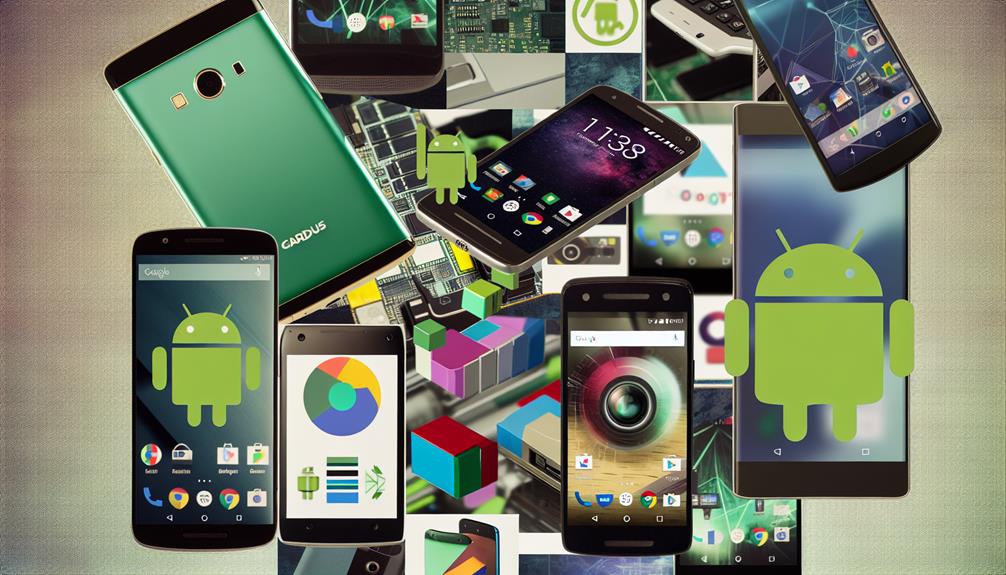Imagine a sleek, modern bridge connecting two vibrant islands—one representing Samsung and the other Android. You might think of Samsung as merely an Android device, but the reality is more complex. While Samsung smartphones run on the Android operating system, they come with a unique layer of customization that shapes user experience in distinct ways. What does this mean for the identity of Samsung within the broader Android ecosystem? Exploring this relationship reveals nuances that could shift your perspective entirely.
Overview of Samsung Devices
When it comes to Samsung devices, you'll find a diverse range that caters to various needs and preferences. Samsung smartphones are at the forefront, offering a spectrum from flagship models with premium features to budget options that still pack a punch. The Galaxy S and Note series exemplify the brand's commitment to camera innovations, boasting advanced photography capabilities that appeal to both casual users and photography enthusiasts.
In addition to smartphones, Samsung's Galaxy tablets provide a versatile experience, allowing for productivity and entertainment. These tablets come equipped with powerful processors and vibrant displays, making them suitable for both work and leisure. The design evolution of these devices has been remarkable, with sleek aesthetics and improved ergonomics enhancing user experience.
Moreover, Samsung's foray into wearable technology, including smartwatches and fitness bands, complements their smartphone ecosystem. These wearables integrate seamlessly with your devices, offering notifications, health tracking, and customizable features that cater to various lifestyles.
One of the key advantages of Samsung devices is their commitment to software updates. Regular updates guarantee that your device remains secure and equipped with the latest features, enhancing its longevity. Whether you opt for a high-end smartphone or a more affordable tablet, the combination of innovative design, robust performance, and consistent support positions Samsung as a leading choice in the tech market. Ultimately, you'll find that Samsung devices offer something for everyone, balancing cutting-edge technology with user-friendly options.
Understanding Android OS
Android OS serves as the backbone for a vast array of devices, including Samsung's extensive lineup. At its core, Android architecture comprises a rich framework that allows manufacturers like Samsung to tailor their devices while maintaining a stable and secure environment. This architecture is built on a Linux kernel, which provides the necessary foundation for performance and security.
When it comes to Android updates, regular enhancements are essential for keeping devices secure and performing at their best. These updates not only patch vulnerabilities but also introduce new features that improve user experience. However, the timeliness of these updates can vary across manufacturers, impacting overall device performance.
Android security is another critical aspect, as it safeguards user data against potential threats. Google implements several security measures, but the effectiveness often hinges on timely updates and the manufacturer's commitment to maintaining security.
A significant advantage of Android OS is its app compatibility. Developers create apps for various Android versions, ensuring a wide selection is available across different devices, including Samsung's. This flexibility contributes to a vibrant ecosystem that meets diverse user needs.
Moreover, Android customization allows users to personalize their devices extensively. From changing launchers to adjusting settings, users can create a unique experience that reflects their preferences.
Samsung's One UI Interface

Samsung's One UI interface enhances the user experience on devices running Android by providing a visually appealing and intuitive layout. This design philosophy focuses on making interactions smoother and more accessible, guaranteeing that you can navigate through your device with ease. One UI achieves this by prioritizing content over clutter, allowing for a cleaner and more organized display.
One standout feature of One UI is its robust customization options. You can tweak your home screen, change themes, and adjust icon sizes to create a personalized environment that suits your style. This flexibility is essential, as it lets you tailor the interface to match how you use your device daily.
Additionally, One UI facilitates seamless app integration, making it easier for you to switch between applications without losing context. Samsung's commitment to regular software updates guarantees that you receive new features and security enhancements, which keeps your device running smoothly and securely.
One UI also emphasizes usability for larger screens, making it ideal for Galaxy devices with expansive displays. The thoughtful arrangement of elements, such as buttons and menus, allows for comfortable one-handed use, making it practical for everyday tasks.
Samsung's Device Ecosystem
Many users find that Samsung's device ecosystem offers a cohesive and integrated experience, making it easier to manage multiple devices seamlessly. This ecosystem is primarily based on the synergy between Samsung hardware and software, guaranteeing that each device works harmoniously with the others. Whether you own a smartphone, tablet, or smart home device, the level of Samsung compatibility enhances your overall experience.
When you invest in Samsung products, you're not just buying individual devices; you're entering a well-connected environment. Here are some key elements that contribute to this ecosystem:
- Samsung hardware: Devices like the Galaxy series and smart TVs work together, providing a unified experience.
- Samsung software: One UI and SmartThings apps enable easy control and customization across devices.
- Samsung accessories: Products like Galaxy Buds and wearables complement your main devices, enhancing functionality.
- Samsung updates: Regular software updates guarantee your devices are secure and up-to-date, enhancing performance.
- Samsung support: Robust customer service helps you troubleshoot issues, guaranteeing a smoother user experience.
Samsung's ecosystem also prioritizes security, protecting your data across devices. With features like biometric authentication and regular security updates, you can trust that your information remains safe. All of these components work together to create a seamless experience that caters to your needs, making Samsung's device ecosystem not just a collection of products but a thorough lifestyle solution.
Comparison With Other Android Brands

When evaluating Samsung alongside other Android brands, it's vital to contemplate how each manufacturer approaches hardware, software integration, and user experience. Samsung advantages often stem from its leading market position, which allows it to invest heavily in research and development. This investment leads to Samsung innovations, such as advanced camera technology and high-resolution displays that consistently outshine many competitors.
In terms of design, Samsung's flagship devices, like the Galaxy series, are known for their sleek aesthetics and premium materials, giving them a competitive edge. However, this premium design does come at a cost, as Samsung pricing tends to be higher compared to other Android brands. This pricing strategy positions Samsung as a premium option, catering to consumers willing to pay for quality and performance.
When it comes to performance, Samsung devices are typically equipped with top-of-the-line processors and ample RAM, ensuring smooth multitasking and gaming experiences. Yet, while Samsung updates are often more timely than some competitors, they can still lag behind smaller brands that focus on a more streamlined device lineup.
In the broader Samsung competition landscape, brands like OnePlus and Google offer compelling alternatives, often emphasizing value and stock Android experiences. While these competitors provide attractive options, Samsung's established reputation and extensive ecosystem continue to make it a dominant player in the Android market. Ultimately, when choosing between Samsung and other brands, consider how these factors align with your preferences and needs.
Custom Features of Samsung
Custom features are a hallmark of Samsung devices, setting them apart in the crowded Android market. When you explore a Samsung smartphone, you'll discover a range of capabilities designed to enhance your user experience. These customizations not only provide aesthetic appeal but also improve functionality and security.
Here are some standout features you might find especially useful:
- Custom themes: Tailor your device's appearance to match your style, using Samsung's theme store for endless options.
- Exclusive apps: Access unique applications like Samsung Health and Samsung Pay, which integrate seamlessly with your device.
- Advanced multitasking: Split-screen mode allows you to use two apps simultaneously, boosting productivity and making multitasking a breeze.
- Enhanced security: Samsung Knox provides an additional layer of protection, ensuring your personal data stays private and secure.
- Unique gestures and gaming mode: Customize gestures for quick actions, and activate gaming mode to optimize performance and minimize distractions while gaming.
Additionally, you can leverage personalized settings to fine-tune your device to your liking. Whether it's adjusting notifications or selecting specific app permissions, these features create a more tailored experience. By integrating these custom features, Samsung not only enhances usability but also solidifies its position within the Android ecosystem, catering to users who crave both personalization and advanced functionality.
Future of Samsung and Android

The future of Samsung and Android is poised for significant evolution, driven by advancements in technology and shifting consumer expectations. As you look ahead, you'll notice that Samsung innovation will play a vital role in enhancing the overall user experience. The company is likely to focus on integrating future technologies like AI and 5G to create seamless interactions across devices, making your everyday tasks more efficient.
Android updates will continue to be pivotal, ensuring that your Samsung devices remain competitive and secure. These updates will not only improve performance but also introduce new features that align with market trends. As mobile gaming grows in popularity, Samsung's partnerships with game developers are expected to yield optimized experiences for gamers, leveraging powerful hardware and software synergies.
In this rapidly evolving landscape, Samsung's ability to adapt to industry competition will dictate its success. With competitors also pushing for innovation, Samsung must continually refine its strategies. Expect to see a greater emphasis on sustainability and personalization, catering to diverse user preferences while aligning with global trends.
Moreover, the focus on mobile gaming will likely spur advancements in graphics and processing capabilities, making Samsung devices the go-to choice for gamers. By prioritizing user experience through cutting-edge technology and strategic partnerships, Samsung is set to redefine its position within the Android ecosystem. Ultimately, the future holds immense potential for both Samsung and Android, creating an exciting landscape for users like you.
Frequently Asked Questions
Are All Samsung Smartphones Running Android Os?
Not all Samsung smartphones run Android OS; however, most do. Samsung features Android customization, allowing you to personalize your device. Always check specifications to ascertain the model you choose meets your preferred operating system.
Can Samsung Devices Run Alternative Operating Systems?
About 27% of Samsung users explore custom ROMs. You can run alternative operating systems on many Samsung devices, but compatibility varies. Always confirm your device supports the desired operating system for the best performance and stability.
What Is Samsung's Relationship With Google Regarding Android?
Samsung's partnership with Google strengthens the Android ecosystem, ensuring seamless integration of software and hardware. This collaboration allows you to enjoy optimized performance, timely updates, and innovative features across Samsung devices powered by the Android platform.
How Does Samsung Contribute to Android's Development?
Isn't it ironic? Samsung's contribution to Android's development includes creating custom features and timely software updates, enhancing user experience. Their innovations considerably shape the ecosystem, ensuring devices remain competitive and appealing in a crowded market.
Are Samsung Apps Available on Non-Samsung Android Devices?
While some Samsung apps may be available on non-Samsung devices, app compatibility often varies. To fully benefit from the Samsung ecosystem, utilizing Samsung devices is generally recommended for peak performance and feature access.
Conclusion
In wrapping up, Samsung's journey with Android is like a well-composed symphony, where the One UI harmonizes beautifully with the Android OS. This partnership not only amplifies user experience but also showcases Samsung's commitment to innovation and security. As technology dances forward, Samsung stands poised to lead the charge, ensuring that every device not only meets but exceeds your expectations. With each update, they're crafting a future that's as exciting as it is secure.






Leave a Reply